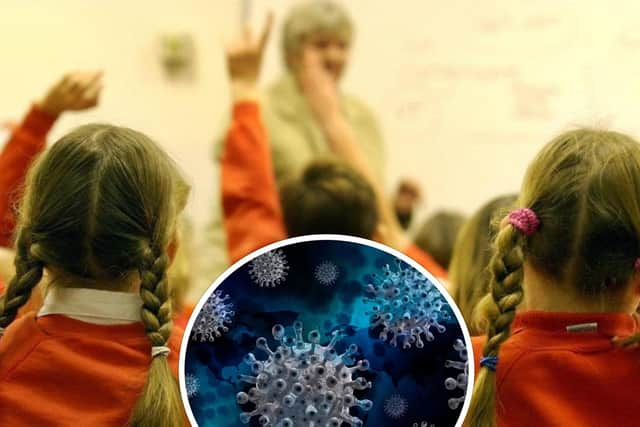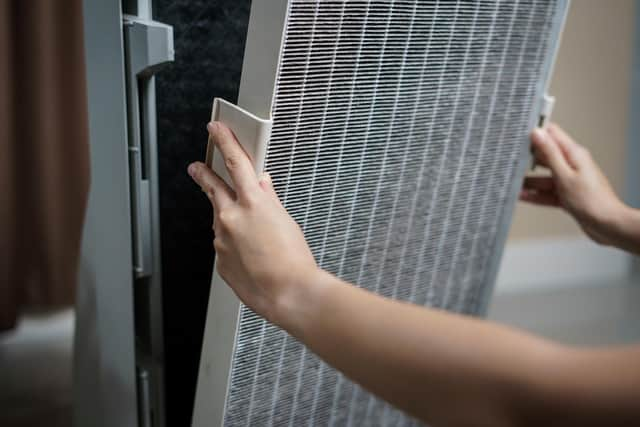'End the hotbed of disease in schools': call for clean air in classrooms
and live on Freeview channel 276
That is the call from a leading Lancashire teaching union official who says that it is vital both for children’s health and their learning that something is done to tackle surging sickness levels.
Ian Watkinson - the county’s representative on the National Education Union executive and chair of the organisation's nationwide health and safety committee - told the Local Democracy Reporting Service (LDRS) that evidence shows the devices help to stem infections in the classroom.
Advertisement
Hide AdAdvertisement
Hide AdHe made the plea for action ahead of the onset of winter, the arrival of the annual flu season and against the backdrop of rising Covid rates - warning that children and school staff could not afford another academic year blighted by illness like the last one.


Department for Education data revealed that the overall pupil absence rate across the country during 2022/23 was 7.5 percent, up from 4.7 percent in 2018/19, the last full school year before the pandemic began.
However, over the same period, persistent absence - defined as a child missing 10 percent or more of lessons - rocketed from affecting 10.3 percent of pupils to 22.3 percent of them.
Mr. Watkinson said that media coverage of the stats when they were published focussed on a raft of possible explanations for the increase, except the one that was actually responsible for it - ill health.
Advertisement
Hide AdAdvertisement
Hide Ad“It is within the government's own data that the [child] absence rate is being driven by respiratory illnesses. And long-term sickness absence rates are also at records never seen before for education workers.


“Parents, teachers, even children themselves know that classrooms are an absolute hotbed for spreading disease - Covid, flu, RSV, glandular fever, everything.
“So why on earth wouldn’t you do something relatively straightforward and cost effective if you were serious about kids not missing days at school and keeping people healthy and safe?” the primary school teacher asked.
Mr. Watkinson pointed to research into the benefits of air filtration units - sometimes known as HEPA filters - which was carried out in Bradford and found that the kit led to a 48 percent “mean reduction in particulate matter” in the classrooms in which it was fitted.
Advertisement
Hide AdAdvertisement
Hide AdWhile the authors of the study - conducted by the British Association of Child and Adolescent Public Health - said that the equipment was “not a panacea”, they concluded that it was “a useful tool [whose] ability to remove particles, including airborne pathogens, could help schools become healthier environments”.
Ian Watkinson also contrasted the lack of such systems in classrooms with their increasing prevalence in the Palace of Westminster and government buildings in Whitehall - including one occupied by the Department for Education (DfE). The Houses of Parliament had specialist equipment installed which the company who supplied it boasts “vastly improved upon the indoor air quality, ensuring that airborne viruses and bacteria were kept to an absolute minimum”
“Surely every child and every school deserves to benefit from the same protection,” Mr. Watkinson said.
“It’s about protecting those at higher risk - and everybody else - from illness, which, in the case of Covid, could lead to disability and even death, because that is still the case.”
Advertisement
Hide AdAdvertisement
Hide AdIn a written submission to the Covid-19 inquiry this week, a trio of groups that support children with Long Covid stated: “Previously fit and healthy adults and children have suffered profound and lasting changes to their lives as they experience the continuing effects of the disease.”
The United Nations kids' agency UNICEF said earlier this year that the best way to protect children from Long Covid was "by doing everything you can to avoid [them] getting infected in the first place".
Lancashire County Council acquired 50 air filtration units earlier in the pandemic to supply to those schools that applied for them. The LDRS understands that 32 were distributed and that the remainder are still on offer, with the authority receiving applications as recently as last month.
There are more than 600 schools in the county council area, around half of which the authority is directly responsible for. It is understood that at least one academy chain operating in Lancashire has HEPA filters in all of its classrooms.
Advertisement
Hide AdAdvertisement
Hide AdThe Department for Education says that it has provided over 9,000 air cleaning units to over 1,300 education settings to help them manage their indoor air quality. These were supplied to establishments that reported sustained high CO2 readings - of over 1,500 ppm - despite taking all other possible steps to improve ventilation, such as opening windows.That is the level of CO2 that the Health and Safety Executive uses as the threshold to indicate poor ventilation. Between September 2021 and April 2023, the DfE delivered over 700,000 CO2 monitors to over 45,000 state-funded settings.